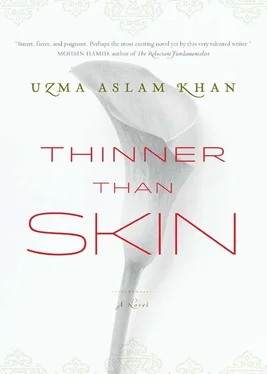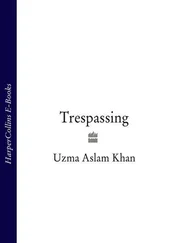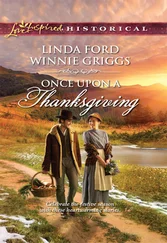“Are you disappointed?”
“I’m relieved.”
“How disappointing.”
So I learned this immediately about my Farhana. She was one of those people who liked to receive a reaction, and she didn’t like to wait very long for it. That day she must have been pleased enough with what I gave, because we met almost every day afterward. And what did I give? Embarrassment. Curiosity. I know she caught me wondering how much she was going to reveal, and she knew that I knew that beneath her T-shirt, she wore no bra. For weeks, that was all I’d see. Nice little Pakistani girl .
“Why do you keep looking up at the bridge?” she asked, about an hour into our rendezvous on the rocks.
I said nothing about the photograph. I never did. But as the sun set, I took several shots of the bridge. In the foreground, there was no surf and no sand, only a line of jagged rocks — without Farhana. She wouldn’t let me photograph her that day.
When we finally stood up to leave, I realized how tall she was. And how boyish.
She knew. “I would have gone topless if I had breasts.” Again, she required a reaction.
I am not an eloquent man and am usually tongue-tied around directness, but directness attracts me. I looked at Farhana and took all of her in, all that she’d spent the afternoon telling me: her work with glaciers, her father in Berkeley, her mother’s death, leaving Pakistan as a young child, her life in this city where she grew up. I took that in while absorbing her height, her leanness, the paleness of her skin, and the way her braid now wrapped around her in a diagonal curve that extended from left shoulder to right hip. I realized I was maybe three-quarters besotted, perhaps halfway in love. I said she looked more like a calla lily than any woman I’d ever met.
“Not just any calla lily,” I added. “Jeffrey Conley’s calla lily. Have you seen it?”
She bowed her head, suddenly self-conscious. Turning her back to me, she took off her T-shirt. “I’ll see you tomorrow then.”
“When?”
“Same time.”
How hard it was to pull away!
Scrambling off the rocks, I glanced up a final time before turning toward my apartment. She’d twisted to one side so her long, deep spine was now perfectly aligned with the braid and both encircled her like an embrace.
The next day, I began courting Farhana. At first empty-handed, and wherever she chose, but by the second month, at her home, and with a gift. I courted her with calla lilies. Nothing delighted me more than descending the hill into the Mission District where she lived, a potted plant in my arms. I knew the flower shops with the widest varieties, from white to mauve to yellow, some with funnels as long and slender as her wrists, slanting in the same way her braid embraced her spine that first time we met, and still embraced her each night as she torqued her body to undress. I longed to photograph that spine but she wouldn’t let me. So instead, with my naked eye, I watched her fingers undo the knots of her braid. I’d learned not to interfere with this lengthy ritual, during which her strokes grew increasingly harsh and her face wore a million different permutations of annoyance. The comb always came away with a wad of black wool that she tossed in the dustbin before climbing into bed, beaming. I loved seeing that smile approach me every night.
This morning in Kaghan, it was I who beamed, as I watched her sleep. I tasted her breath with the roof of my mouth. Pine and glacier steam. I traced the fleshiness of her lips with the tip of my nose. Her mouth was a pale beige tinted with the softest pink, the delicate rim so subtle in its arch. She seldom wore lipstick, for which I was thankful, because her naked mouth blended beautifully with the rest of her. When worried, her tongue would dig the subtle indent at that luscious lower lip, and sometimes the thumb would cooperate, picking at plumpness, drawing blood. I learned this gesture in the days after we first met. I learned it especially on the bus to Kaghan Valley. But this morning, she slept peacefully; the tongue was still and so was the thumb. I tasted her again. More steam than pine. Farhana’s morning breath was never her worst feature, though she’d cringe at that, demanding, What’s worse?
Our cabin was old. Perhaps its walls were the source of the pinewood scent enveloping our bed. The doorframe was a medley of pale and dark wood. I imagined the hand that must have reached for blond walnut when the dark cedar was gone, reached for red polish when the brown was upturned. Perhaps the man attached to the hand had been unable to walk to wherever the red was kept. Perhaps he’d been older than the cabin was now. Perhaps he didn’t belong to this land but had come from a windier, sandier world.
I lay on my back, rolling the word Kaghan around my tongue the way last night I’d played with Kunhar . Did the word come from Kagan, a woman who’d arrived in this valley long ago? On a previous trip, I’d heard stories, fragments that never extended far enough into history books but lingered in the air. Some said Kagan was descended from the pagan Kafir-Kalash tribe of Chitral Valley, to the west. Others said in secret that she was barely human, and belonged to a world of fairies and spirits. She was accessible only to those who worshipped her, and when she appeared, she wasn’t dressed like a Kalash woman at all. She wore mist and rode a horse.
Or had the word Kaghan come from K h agan, a grander version of Khan? The Turkic rulers who’d spread from Turkey to China on the ancient Silk Road had divided into two, one branch becoming the lion khans, the other, camel khans. Now this valley had neither lions nor camels. But it did have owls. And horses. Were its earliest inhabitants owl khans? Horse khans?
Most of the horses in the valley belonged to the semi-nomadic tribes that spent their summers in the mountain pastures and winters down in the plains. We’d be seeing them later today at the lake. No one knew where the nomads had come from but they were believed to have ridden down from the Caspian steppe thousands of years ago, and perhaps had once been Turkic-speaking. A third rumor held that Kagan had been one of them. And she had been a pari khan — ruler of fairies.
Beside me, Farhana inched a little higher on her pillow, blowing glacier steam in my eyes. Apart from her, nothing stirred. Kaghan mornings in our cabin were windless.
I walked to her side of the bed. On the bedside table lay a map, with Kaghan Valley circled in red at the easternmost corner of the North-West Frontier Province, on the edge of Kashmir. I’d drawn the circle on the bus to the valley, telling Farhana that to see the Frontier, you had to imagine it as the profile of a buffalo’s bust, facing west, with the capital Peshawar the nose, Chitral Valley the backward tilting horn, Swat Valley the eye, and Kaghan Valley the ear. The Frontier listened to Kashmir at its back while facing Afghanistan ahead, and it listened with Kaghan.
On the bus, Farhana had refused to listen to me, or to Kaghan. She’d picked at her lip, reminding me that we were never meant to be here at all. Until last night, I didn’t think she’d ever forgive me.
I opened the cabin door. I listened to Kaghan. Around me rose rounded hills, scoops of velvet green on a brick-red floor. Like the mossy moistness of rain-kissed tailorbirds. It was for this I’d come, not to upset my beloved. Around us the valley undulated like the River Kunhar that gave it shape, cupping nine lakes in its curves, sprouting thick forests of deodar and pine, towering over 4,000 meters before halting abruptly at the temples of the Himalayas and the Karakoram. The only way through the mountainous block was by snaking along hair-thin passes, as if by witchery. Here the overwhelming sensation was not a closing or crowding. Not exactly. It was more a cautioning — a slope to the side, a wait and see. The buffalo’s ear is always cocked.
Читать дальше












